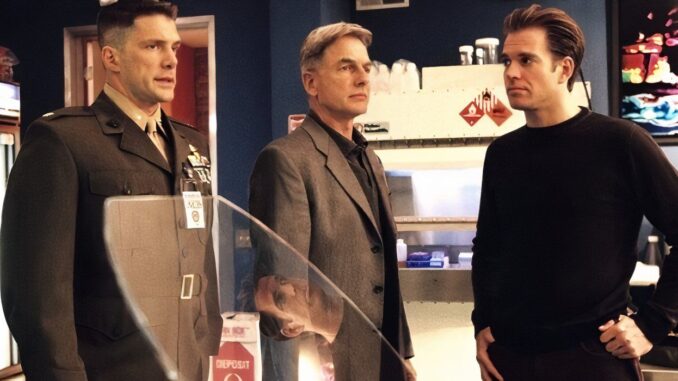
Gibbs and the Team: A Legacy Forged in Fire, Tempered by Loyalty
Leroy Jethro Gibbs. The name itself evokes a symphony of mental images: the steely gaze, the stoic silence, the endless cups of black coffee, and the ritualistic boat-building in his basement. For years, he was the bedrock of NCIS, a figure both feared and revered, his leadership style a unique blend of intuition, experience, and the famous Gibbs' Rules. We knew him, or thought we did, as the unwavering father figure to a team of fiercely loyal agents. But beneath the surface, beyond the head slaps and the gruff pronouncements, lay a complex tapestry of relationships, each strand woven with shared trauma, unwavering loyalty, and a deep, often unspoken, love. Looking back, perhaps we never truly saw Gibbs and his team until we started looking beyond the case files and into the heart of their shared humanity.
Initially, the team dynamic felt almost manufactured. Tony DiNozzo, the charmingly annoying second-in-command, provided the comic relief and youthful energy that balanced Gibbs’s gravitas. Ziva David, the enigmatic Israeli assassin, brought a lethal intensity and a foreign perspective, a challenge to Gibbs’s rigid framework. And Timothy McGee, the ever-earnest and technologically gifted “Probie,” represented the future of NCIS, a stark contrast to Gibbs’s old-school methods. These were pieces on a chessboard, strategically placed by Gibbs to achieve the desired outcome: justice. Yet, as the seasons unfolded, these carefully curated roles began to blur, revealing the messy, unpredictable beauty of human connection.
Consider Tony. Initially presented as a frivolous womanizer, his loyalty to Gibbs was unquestionable. He absorbed Gibbs’s lessons, mimicking his mentor’s mannerisms and strategies, yet slowly forging his own path. We saw him evolve from the playful foil to a capable leader, proving himself time and time again, not just through his investigative skills, but through his unwavering support of his teammates. He became a brother to McGee, a sparring partner and confidante to Ziva, and ultimately, the surrogate son Gibbs never explicitly acknowledged. The humor, the pranks, the constant needling – it was all a shield, protecting a deep-seated fear of inadequacy and a profound need for acceptance, a need Gibbs recognized and, in his own inimitable way, nurtured.
Then there was Ziva. Arriving as a force of nature, a whirlwind of dangerous skill and conflicted loyalties, she challenged everything Gibbs stood for. Her past, steeped in violence and espionage, was a stark contrast to his relatively straightforward, albeit traumatic, past. Yet, Gibbs saw beyond the warrior, recognizing the vulnerable young woman hidden beneath the hardened exterior. He provided her with a safe haven, a place to heal and rebuild, fostering a deep connection that transcended cultural and professional boundaries. The quiet understanding between them, the shared glances that spoke volumes, revealed a mentorship that went beyond training, a father-daughter bond forged in the crucible of shared danger and mutual respect.
And what of McGee? He was the antithesis of Gibbs: a rule-follower, a tech wizard, someone who relied on logic and data rather than gut instinct. He was, initially, the butt of Tony’s jokes and the recipient of Gibbs’s frequent head slaps. But Gibbs saw potential in McGee, a genuine desire to do good, a sharp mind hidden beneath a veneer of awkwardness. He pushed McGee beyond his comfort zone, forcing him to trust his instincts, to think on his feet, and to embrace the chaotic reality of field work. Over time, McGee blossomed, becoming a confident and capable agent, proving that even the most technologically advanced minds could benefit from a little old-fashioned intuition, and a steady dose of Gibbs’s tough love.
But perhaps the most telling examples of the team dynamic lay in the moments of crisis. When Ziva was presumed dead, Tony embarked on a relentless quest for answers, driven by a grief that belied their playful banter. When Gibbs was shot, the team rallied around him, their individual strengths combining to protect their fallen leader. These moments revealed the profound interconnectedness of the group, the unshakeable loyalty that bound them together. It wasn't just about solving cases; it was about protecting each other, about honoring the shared sacrifice and unwavering commitment that defined them as a team.
Gibbs’s unconventional leadership, his unwavering dedication to his agents, and the profound loyalty he inspired created something truly unique. He wasn’t just their boss; he was their mentor, their protector, their family. While we saw the cases they solved, the villains they apprehended, the rules they sometimes bent or broke, perhaps we only truly saw the team when we recognized the depth of their shared history, the unspoken bonds that held them together, and the profound humanity that lay beneath the surface of the seemingly impenetrable Leroy Jethro Gibbs. The boat in his basement wasn’t just a hobby; it was a metaphor for the team itself, painstakingly crafted, weathered by storms, and ultimately, a testament to the enduring power of loyalty and love.